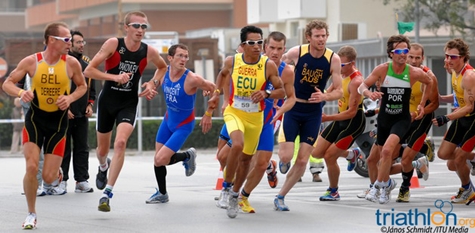
 |
Leadership Contributes to a Vigorous Life,by Dan Ballbach |
|
The Relationship Between Leadership and a Fuller Life
"One leader made my life miserable and took years off my life"
The relationship between leadership and fuller, more vigorous lives is under appreciated. The effective practice of the art of leadership may be a powerful contributor to a fuller life alongside commitments to (i) engage in aerobic sports such as Swimming, Running, Cycling or Hiking, (ii) Clear Thinking, (iii) Natural Nutrition, (iv) good Sleep, Rest and Recovery patterns and (v) a positive approach to life. The development of leadership skills can help us reach our Ideal Performance State. A focused effort to develop leadership skills can enhance the quality of your lifestyle. More data collection and analysis of this hypothesis is warranted from the following introductory exploration.
Leadership and its corollary, followership, are ubiquitous companions. We tend to migrate between these states on a daily or hourly basis to a greater or lesser extent as our respective lives dictate. It seems to follow intuitively that on the basis of time spent the quality of our leadership or followership experience impacts longevity and fullness of life. If we can make our experiences with those companions fulfilling, certainly our lives will be fuller and more vigorous. The word "fulfilling" is intended to acknowledge that it is unrealistic to assume pain free or loss free leadership or followership experience. Instead the manner in which we as leaders and followers transit difficulties and move on has substantial bearing on short and long term success. Because successful leadership has the potential to enhance individual longevity and fullness, this article identifies some of the desirable characteristics of such leadership.
Leadership and management are frequently distinguished from each other, but here I blend them under the general rubric of influencing or causing action to occur. Effective leaders are able to challenge, enable and encourage others in a specific direction. They often inspire and demonstrate by their behavior the way in which they seek others to go. Of course, the context of leadership is critically important. A ship captain does not need to inspire a helmsman to make an immediate turn to starboard. The context give the captain power and compliance with the captain's directive is the product of the selection and training of followers for a command setting. Avoiding shipwreck can mean longer life! But, more of our adult life involves contexts where command leadership is not the motivation for action.
Leadership Traits and Skills
Successful leaders call on a variety of qualities in varying degrees and with varying success to get others to act. Linking leadership qualities and longevity calls for contributions from multiple disciplines including psychology, biology, medical science, nutrition, and other scientific fields. And yet, there are some widely acknowledged tenets of leadership which merit special attention for their possible full and vigorous life implications.
1. Know Yourself/Be Yourself
The components of knowing yourself include personality, behavior style, thinking patterns, upbringing, biases, likes, dislikes, exposure to disparate personalities and behavior styles, experience, strengths, weaknesses, successes, failures, assumptions, attitudes, beliefs, values and more. Successful leaders are better able to self assess and apply self assessment to the situation. They know what they bring to the leadership role and, perhaps more important, they know what they do not bring and must be supplied by other people. Successful leaders are not faking it, but are genuine and understand that people respond to who you are even more than what you do or say. People learn who you are as they listen and observe. Leaders who touch base with their thinking and emotions frequently adapt and respond more effectively to situational needs.
2. Listen and Ask Questions
As leaders, we often feel we must be in control and that feeling conflicts with listening and with asking questions because those behaviors may reveal we do not have all the answers. So much of what leaders confront today is not reducible to a technical solution. The unknowns predominate and any direction has risks. The context must be probed and evaluated and decisions made on best available data. Even when the direction is seemingly known and familiar, leaders who can pause and reflect on the context and on contextual understanding are better positioned for success. Closely associated with listening and asking questions are humility, patience and a desire to learn.
3. Develop Uncertainty Tolerance
Leadership guarantees uncertainty no matter the perceived stability and predictability of the leadership position we have been given. The status quo is the exception and thus we live in persistent change. The demands of change leadership challenge our personal and organizational uncertainty capabilities. Chronic uncertainty and poor coping with uncertainty are precursors to excessive stress and anxiety. We know the potential debilitating effects of these psychological states. Perhaps more than any other leadership attribute our living with and learning from uncertainty is an understandable link to a fuller life and longevity.
4. Practice Candor
So much can be attributed to the trait of candor in leaders. Far beyond the scope of this article is the understanding that candor includes (i) the appropriate application of transparency, (ii) the ability to surface and deal with known but difficult issues, and (iii) the effective use of direct communication. Effective leaders are candid while displaying empathy, direct without being hurtful and inspiring while being honest and realistic. The effective practice of candor contributes mightily to the development of trust and confidence in leaders. To the extent candor is embedded in the culture, trust grows.
Leaders Maintain and Grow Relationships
Leadership calls for much more than the above traits. For example, some would insist that how a leader responds to failure or mistakes is necessarily part of the list. The quality and quantity of social contacts and close relationships is a well recognized contributor to health and well being. Leaders maintain and grow relationships while serving in a leadership role only with careful attention and steady nurture. We can also look at leadership, not as a list of traits or skills, but as a combination of (i) theoretical knowledge which focuses on the why and what of a problem, such as cash flow or capital contraints, (ii) skills, such as communications or financial management, and (iii) wisdom or experience that transcends the theoretical or the technical, sometimes viewed as common sense, intuition, or the ability to distill a situation and say "been there done that and this time it is the same or different". Under such a three pronged approach to leadership, success comes from effective balance of the combination. My purpose here is not to catalog leadership traits or formulations. Grounding in the above four traits is a grand start.
The School of Hard Knocks
A few years ago I had the opportunity to serve in the CEO role for a company that went through an ownership transition. Shortly after assuming the leadership role I undertook several strategic and operational initiatives, including a physical move of the headquarters, a new geographical operation, merger discussions and internal cultural shifts. The efforts were all initiated in a short span of time. Soon I experienced resistance and a distinct lack of interest and energy toward the initiatives. I became frustrated and intensified my efforts to achieve the initiatives largely by becoming more directive and less patient. Hindsight gives me the perspective that I was ineffective and inexperienced in all four traits listed above. I did not (i) know or take the time to reflect on how I was reacting to the response of the followers, (ii) ask questions and listen to the concerns about pace and direction, (iii) see the uncertainty I was causing, or (iv) appreciate or understand the culture of the organization and how it was impeding or altering the pace and direction of my initiatives. My leadership longevity was directly impacted! I am convinced our collective lives were not fuller in those times, but mine is fuller because of what I learned from the experience.
Toward Fuller More Vigorous Lives
So. is it all about being nice and keeping everyone comfortable and then we can all live happily ever after? Of course not. Leaders are called upon to make tough decisions and daily life has frustration, failure, discomfort, pain and loss. Conflict and even chaos are part of the life of leaders and followers. There is a strong body of thought which sees conflict and chaos as important sources of innovation and creativity. The tough work of leadership is to build safe confines or boundaries in which healthy conflict can occur and the resulting outcomes valued and rewarded. Within that environment creativity can blossom and learning can be experienced.
When Creativity and Learning combine with talent, skill, resources and energy, leaders and followers experience progress. Progress alone may be an appropriate, realistic goal from the exercise of effective leadership traits. After all, much of what we do in a daily personal and work life is take action toward a desired but imprecisely defined target. Progress can lead to failure. Progress can lead to success. A leader once said "failure is our most important product." How can we profit from our individual experience with progress, failure and success? Leaders who engage followers using the traits of self knowledge, listening, uncertainty tolerance and candor are better positioned to experience and contribute to the under appreciated byproduct of fuller more vigorous lives.
Dan Ballbach, founder of Ascent Leadership, LLC, is an executive and consultant who practiced law for 24 years before embarking on a second career in Leadership in 1996. Dan earned his undergraduate degree at the U.S. Naval Academy and a J.D. from Duke University School of Law. In 2007 he earned a master's degree in organizational change leadership from the HEC School of Management in a joint program with the University of Oxford Said Business School. His professional experience includes government, manufacturing, utility, non-profit, law, medical, and engineering and environmental consulting sectors. More about Dan at The Change Leaders. Email Dan at : danballbach@ascent-leadership.com
<-- back to top




